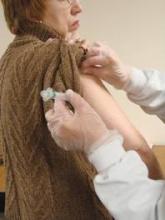Use of the flu vaccine was consistently associated with a lower risk of adverse cardiovascular events in a meta-analysis of the worldwide medical literature, according to a report published online Oct. 23 in JAMA.
The risk reduction was greatest among people at highest cardiovascular risk, said Dr. Jacob A. Udell of Women’s College Hospital, University of Toronto, and his associates.
"Our findings provide some support for current guideline recommendations for influenza vaccination of patients with acute coronary syndromes," they noted.
In particular, the finding that a simple, once-yearly injection may prevent scores of cardiovascular deaths, hospitalizations, MIs, strokes, and cases of heart failure, urgent coronary revascularization, and unstable angina also is of "considerable clinical and health policy importance, given the profound underuse of vaccination among the general public and the potential impact this preventive strategy may have on high-risk patients," the investigators added.
Several observational studies have suggested an association between acute respiratory infection and increased risk of cardiac and cerebrovascular events, and some have suggested that such infection may trigger rupturing of atherosclerotic plaque, fluid-overload heart failure, myocarditis, or arrhythmia. But whether or not influenza immunization could actually prevent such events remains controversial.
Dr. Udell and his colleagues performed a systematic review of the literature from the inception of database entry (1946) to the present, identifying 71 potentially relevant studies to review. They then performed a meta-analysis of the 12 randomized clinical trials in which influenza vaccination was compared against either placebo or standard care, and in which cardiovascular outcomes during the year following vaccination were reported.
Five of the 12 randomized clinical trials were considered to be of high quality and the remainder were of low or uncertain quality. The meta-analysis included 6,469 participants (mean age, 67 years) who had varying degrees of cardiovascular risk.
"Despite differences in trial designs, risk of bias, sample size, cardiovascular risk of participants, circulating influenza activity, vaccination strategy, duration of follow-up, and number of observed events, our meta-analysis demonstrated a consistent association between influenza vaccination and a lower risk of CV events," the investigators said.
The overall rate of the primary end point, a composite of all major adverse cardiovascular events, was 2.9% among recipients of the influenza vaccine (95 of 3,238 patients). This was significantly lower than the 4.7% rate (151 of 3,231 patients) among control subjects.
The number needed to treat to prevent a single major adverse CV event was 58, Dr. Udell and his associates said (JAMA 2013 Oct. 23 [doi:10.1001/jama.2013.279206]).
In a subgroup analysis involving patients known to have coronary artery disease, influenza vaccination was even more protective. For example, the rate of major adverse CV events was 10.25% among vaccinated patients with a history of recent acute coronary syndrome, compared with a rate of 23.1% among control subjects. The number needed to treat to prevent a single CV event in this subset of patients was only 8.
Less than one-third of the general population in North America and less than half of those at high cardiovascular risk currently receive the annual flu vaccine. Therefore, the flu vaccine "could address a sizable component of residual CV risk not addressed by current therapy, and provide yearlong coverage through a simple inoculation," the researchers said.
"Future research with an adequately powered multicenter trial to confirm the efficacy of this low-cost, annual, safe, easily administered, and well-tolerated therapy to reduce CV risk beyond current therapies is warranted."
The Canadian Institutes for Health Research and the Canadian Foundation for Women’s Health supported the study. Dr. Udell reported no financial conflicts of interest; his associates reported numerous ties to industry sources.


